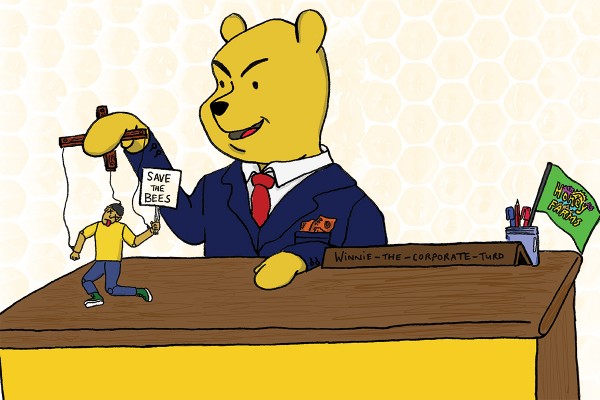Psyop: “Psychological Operation”. Operations to influence the emotions, motives, objective reasoning, and ultimately the behaviour of governments, organisations, groups, and individuals.
Big Honey, backed by international governments and agriculture lobbyists, just pulled off the greatest psyop of the 21st century and nobody noticed. Almost overnight, the popular opinion of bees turned from a vague fear to an unanimous outpouring of love. Bees are everywhere: all over T-shirts, tattooed on people’s forearms, and in cutesy art pieces across the entirety of Pinterest. “Save the bees” became a calling card for the young and planet-conscious, because who doesn’t love pollinators? The fuzzy little bastards were a perfect mascot for a greater community of climate-concerned youth.
But this was a sham. It was orchestrated from the highest level by a cabal of Big Honey industrialists, determined to support their flailing industry and distract from the ecological consequences of their work.

 www.critic.co.nz
www.critic.co.nz
Big Honey, backed by international governments and agriculture lobbyists, just pulled off the greatest psyop of the 21st century and nobody noticed. Almost overnight, the popular opinion of bees turned from a vague fear to an unanimous outpouring of love. Bees are everywhere: all over T-shirts, tattooed on people’s forearms, and in cutesy art pieces across the entirety of Pinterest. “Save the bees” became a calling card for the young and planet-conscious, because who doesn’t love pollinators? The fuzzy little bastards were a perfect mascot for a greater community of climate-concerned youth.
But this was a sham. It was orchestrated from the highest level by a cabal of Big Honey industrialists, determined to support their flailing industry and distract from the ecological consequences of their work.

OPINION: “Save the bees” is a psyop and we all fell for it.
Psyop: “Psychological Operation”. Operations to influence the emotions, motives, objective reasoning, and ultimately the behaviour of governments, organisations, groups, and individuals. Big Honey, backed by international governments


